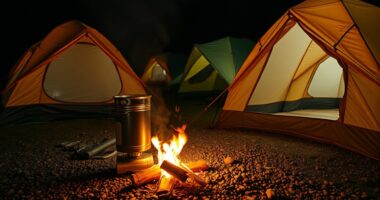To breathe easier, focus on reducing indoor dust and avoiding outdoor pollen. Keep windows closed during peak pollen times and use air purifiers with HEPA filters. Regularly dust with damp cloths and wash bedding often to cut down on allergens. Stay aware of local pollen forecasts and limit outdoor activities when counts are high. By taking these steps, you’ll minimize triggers and improve your air quality—learn more about effective strategies below.
Key Takeaways
- Keep windows closed during peak pollen seasons and use air conditioning with clean filters to reduce outdoor pollen entry.
- Use high-efficiency particulate air (HEPA) filters and air purifiers indoors to trap dust and pollen particles.
- Regularly wash bedding, curtains, and vacuum with HEPA filters to minimize indoor dust and allergen buildup.
- Maintain proper indoor humidity levels to prevent mold growth, a common indoor allergen.
- Stay informed about local pollen forecasts and plan outdoor activities to minimize exposure during high pollen times.

Have you ever wondered why your allergies flare up during certain times of the year? It’s because of the invisible particles floating around—dust and pollen—that trigger your immune system. When these allergens are in the air, your body sees them as threats and reacts by sneezing, coughing, and watering eyes. Understanding where these particles come from and how to minimize your exposure can make a big difference in how you breathe and feel.
Allergy flare-ups are caused by invisible dust and pollen particles triggering your immune system.
Dust is everywhere—inside your home and outside. It’s made up of tiny particles like dead skin cells, pet dander, mold spores, and even microscopic bugs. These particles settle on surfaces, but they can become airborne when you dust, vacuum, or open windows. If you’re sensitive, dust can irritate your airways, causing congestion and discomfort. To combat this, regular cleaning is essential. Use a vacuum with a HEPA filter to trap more dust and allergens. Dust surfaces with a damp cloth instead of a dry duster, which just kicks dust back into the air. Keeping humidity levels low also discourages mold growth, which is a common indoor allergen. Vetted cleaning products can help ensure thorough and safe dust removal.
Pollen, on the other hand, comes from trees, grasses, and weeds. It’s released into the air during certain seasons, and when you breathe it in, your immune system reacts. Pollen counts tend to be highest early in the morning and on windy days. To reduce exposure, keep windows closed during peak pollen season, especially in the mornings. Use air conditioning with a clean filter to filter out pollen particles. Wearing sunglasses outdoors can also help shield your eyes from airborne pollen. When you come inside, change your clothes and wash your hair to remove any pollen that’s stuck to you.
While dust and pollen are common culprits, your lifestyle choices can influence your allergy symptoms. Stay informed about local pollen forecasts and plan outdoor activities when levels are lower. Consider investing in an air purifier for your home, especially in bedrooms, to create a cleaner breathing environment. Regularly washing bedding and curtains can also lower the buildup of dust mites and pollen, reducing your overall exposure.
Frequently Asked Questions
Can Allergy Symptoms Change With Seasons Unexpectedly?
Yes, allergy symptoms can change unexpectedly with the seasons. You might notice more congestion or sneezing during specific times, like spring or fall, due to fluctuating pollen levels. Weather changes, such as rain or wind, can also trigger symptoms unexpectedly. Keep track of your symptoms and stay alert to seasonal shifts, so you can adjust your allergy management plan accordingly and find relief when symptoms worsen.
Are There Natural Remedies to Reduce Dust and Pollen Allergies?
You might notice a sudden relief from allergy symptoms when you incorporate natural remedies like honey, which can help build immunity, or nasal rinses to clear irritants. Breathing in steam infused with eucalyptus or peppermint can soothe your nasal passages. Additionally, keeping a clean environment by vacuuming regularly and using air purifiers reduces dust and pollen. These simple, natural steps can make breathing easier and lessen allergy discomfort over time.
How Does Climate Change Influence Allergy Seasons?
Climate change extends allergy seasons by increasing temperatures and altering weather patterns. You’ll notice pollen levels rise earlier in spring and stay longer into fall, making allergy symptoms worse. Warmer weather encourages plants to produce more pollen, and unpredictable rain can spread allergens. To cope, stay indoors during peak pollen times, keep windows closed, and consider using air purifiers. Staying informed about allergy forecasts helps you manage symptoms better.
Do Air Purifiers Eliminate All Types of Airborne Allergens?
Air purifiers can’t eliminate all airborne allergens, but they’re your shield in a battle against tiny invaders. Think of them as sieves that trap many particles, like pollen, pet dander, and dust mites, improving your indoor air quality. However, some allergens are too small or stubborn to catch. To maximize their effectiveness, use high-quality filters, keep your space clean, and maintain proper ventilation alongside your purifier.
Can Diet Impact Allergy Severity or Frequency?
Yes, your diet can impact allergy severity and frequency. When you eat anti-inflammatory foods like fruits, vegetables, and omega-3-rich fish, you may reduce allergy symptoms. Conversely, consuming processed foods or dairy might worsen your reactions. Staying hydrated and avoiding known allergens in your diet helps your immune system function better. By choosing your foods wisely, you can potentially lessen allergy flare-ups and improve your overall comfort.
Conclusion
Now that you know how dust and pollen can trigger allergies, the next step is essential. Will you take action to protect your breathing, or risk letting allergens take over? Simple changes could make all the difference—but only if you decide to act. The secret to breathing easier might be closer than you think. Are you ready to uncover it and finally find relief? The choice is yours—your health depends on it.










